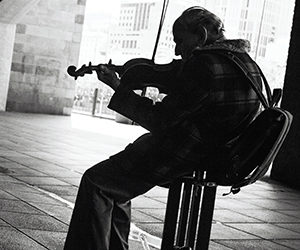Let all guests who arrive be received like Christ, for he is going to say:
I was a stranger and you welcomed me. (Mt 25: 35)
~ Rule of St Benedict 53:1-2
This quote from Benedict’s Rule is a foundational expression of the principle of hospitality at work: I am called to welcome in every stranger who comes to the door as the face of the divine.
I love this invitation of the Rule. I consider what this means at its foundation: that everything that seems strange, foreign, or uncomfortable, is the place where God especially shimmers forth.
This hospitality applies to those who arrive at the door to my outer world in terms of people and experiences I find difficult or challenging. But equally important, I think that Benedict is also pointing us to an inner kind of hospitality. I find this principle even more vital when applied to the inner life, because that is where hospitality begins.
 The Sufi poet Rumi writes about this inner “guest house” with its new arrival each day including joy or sadness, anger or depression. Welcome them each in, because “each has been sent/as a guide from beyond.” All of the feelings I encounter that make me want to slam the door on my inner life — these are precisely the place where we are called to meet God.
The Sufi poet Rumi writes about this inner “guest house” with its new arrival each day including joy or sadness, anger or depression. Welcome them each in, because “each has been sent/as a guide from beyond.” All of the feelings I encounter that make me want to slam the door on my inner life — these are precisely the place where we are called to meet God.
Instead of being able to say that God appears only in what is familiar, only in the people who make me feel comfortable and safe and look like me, hospitality calls on us to extend ourselves, to risk. Monasticism challenges the very core of this assumption that what is safe is what is most sacred.
These days I am living in a foreign culture, and one of the gifts and graces is discovering where my own hidden assumptions are about how things should work. From greeting others to grocery shopping to banking to eating in restaurants, I am continually being challenged with what feels strange. All of the daily tasks of life become less comfortable, less familiar, and in the process I am learning more compassion for my own responses and limitations. My assumptions are being stretched apart and I am called to welcome in this strangeness as a face of God.
Jungian psychologist Ann Bedford Ulanov writes that, “The Holy refuses to stay put in a box . . . These meetings with G od well beyond our images of God comprise great religious moments that smash us, or open us further to the transcendent or both. Mystics write of these moments.” It is the moments that break us open, that move us beyond what is conventional or familiar, that strip the illusion of safety and security from our fingers, in which we begin to plumb the depths of the holy.
od well beyond our images of God comprise great religious moments that smash us, or open us further to the transcendent or both. Mystics write of these moments.” It is the moments that break us open, that move us beyond what is conventional or familiar, that strip the illusion of safety and security from our fingers, in which we begin to plumb the depths of the holy.
Most of us don’t want God on these terms, but on our own. We try to domesticate the sacred into prayers and doctrines that follow our own rules. We want to understand why things happen as they do, so we create trite responses to people in suffering.
Jung once said in a BBC interview that he began calling God all those “things which cross my willful path violently and recklessly, all things which upset my subjective views, plans and intentions, and change the course of my life for better or for worse.” The divine is that power which disrupts everything.
What if our practice were to court a holy disruption? To welcome in everything which challenges my perspective on how the world works, which upsets all the plans I have for myself, and turns them on their heads?
What if when life started falling apart, I opened my heart to welcome in the grief and fear that arrived as well and considered them as holy guides and windows into the immensity of God? What if all the painful feelings of loss and disorientation were invited in for tea and tenderness? What if everything that turns our preconceived ideas inside out is precisely where we find God?
I do not mean to imply that everything “bad” or painful that happens is somehow part of an inscrutable plan. This again puts God back in the box. Welcoming in the inner experience does not mean validating the outer facts and the terrible things people do to one another.
What I do mean is that we are called to make space for the full range of our experiences of discomfort, strangeness, and loss, and cultivate trust that these draw us into an encounter of radical openness, where our walls have been torn down. The power comes in what can emerge through God when we treat our experience and emotional response to loss as honored guests.
It does mean trusting that somehow the brokenness we experience, when truly welcomed in, can become a doorway into a more expansive way of living and imagining the world.
 When we practice this kind of radical hospitality to all the ways holy disruption arises in our lives, we make room for the possibility that fear does not have to compel our every response. We begin to experience more kindness to everything that feels difficult within and so this begins to flow outward to others.
When we practice this kind of radical hospitality to all the ways holy disruption arises in our lives, we make room for the possibility that fear does not have to compel our every response. We begin to experience more kindness to everything that feels difficult within and so this begins to flow outward to others.
We no longer feel compelled to limit who might be included in the realm of God’s love and we cling less tightly onto our own agendas. We begin to see that God is so much bigger than our own imagining and so we talk with more humility. We are willing to consider that we might have been wrong all this time.
In a culture where people are encouraged to get over their “negative” feelings and public debate is governed by so much divisiveness and certainty about who is right, monasticism has much to teach us what is truly welcome.







